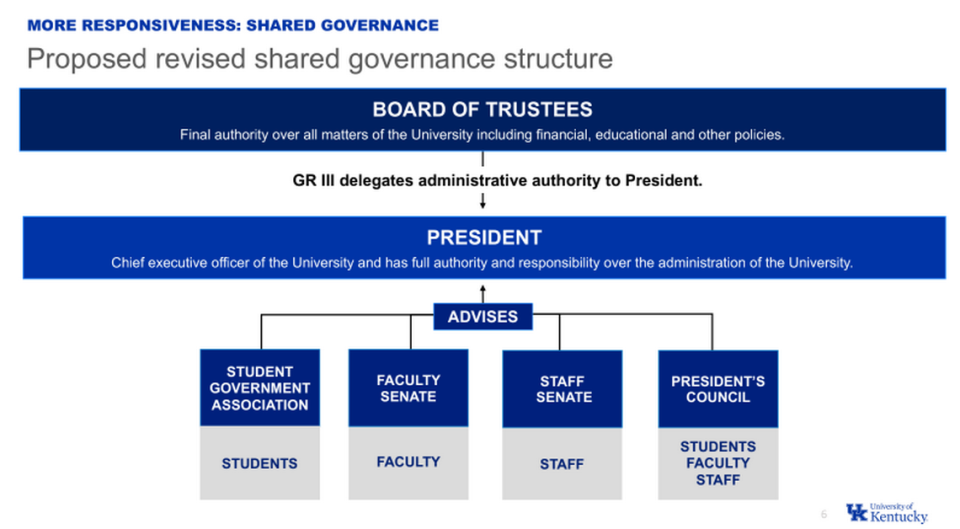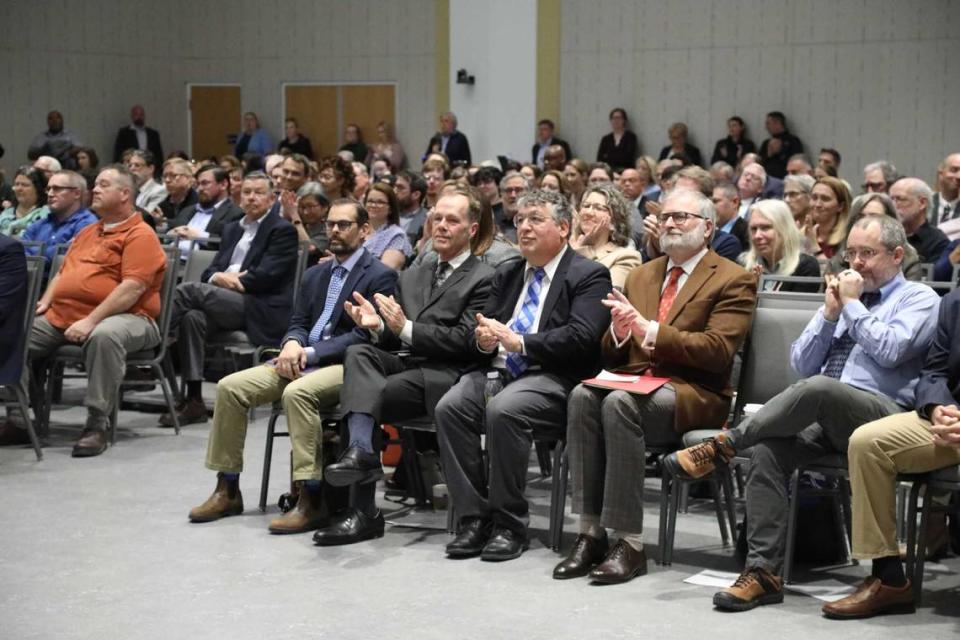What is a vote of no confidence? UK faculty to consider vote against president
In our In the Spotlight stories, Herald-Leader journalists bring you continuing coverage of news and events important to our Central Kentucky community. Read more. Story idea? hlcityregion@herald-leader.com.
The University of Kentucky university senate is expected to consider a vote of no confidence in President Eli Capilouto on Monday, after two months of disagreements about the role of the senate.
A “resolution of no confidence” has been added as an agenda item for the university senate’s meeting, the last meeting of the semester. The resolution also calls on the board of trustees to “redo the process of shared governance reform” to address the senate’s concerns, and to develop new recommendations.
The trustees voted last week to approve changes to the university’s governance proposed by Capilouto, which would move the university senate from a policy-setting body into an advisory role. The Student Government Association and staff senate, who both supported the proposed changes, would have advisory roles as well. Faculty members have expressed concerns about the process the university used to create the recommendations that were ultimately approved by the board.
“In formulating his recommendations, the President made significant, repeated management errors that have created unnecessary confusion, anxiety, and risk within the UK community,” the resolution reads.
Additionally, the resolution says Capilouto “created unnecessary and harmful division when he amplified false narratives that faculty members on the University Senate do not prioritize student needs or value diverse representation.”
Capilouto has been the president of UK since 2011, and holds the longest tenure of any other current public university president in the state. He’s one of the highest-paid public university presidents in the country, according to U.S. News and World Report. Capilouto has been praised for his job performance by trustees, but in his most recent performance evaluation, the board listed strengthening relationships with faculty and shared governance as areas for improvement.
UK university senate to call for vote of no confidence in President Capilouto next week
Britt Brockman, chair of the board of trustees, said the board “unequivocally supports President Eli Capilouto and the work of the UK community to meet Kentucky’s needs.”
The university senate has never held a vote of no confidence in the president, said Davy Jones, UK professor emeritus who tracks the history of the university’s governance, though department faculty has voted no confidence in department chairs.
In 1989, the university senate council passed a resolution requesting that former Kentucky Gov. A.B. “Happy” Chandler resign from the board after using a racial slur, and in 1999, the senate passed resolutions urging the board to rescind a contract extension from former President Charles Wethington Jr., according to Herald-Leader and Kentucky Kernel archives.

What is a vote of no confidence?
A vote of no confidence does not immediately result in the removal or firing of a university president. The vote is symbolic of the faculty’s lack of trust in leadership.
It signals from the voting faculty that they find “some aspect of the senior leader’s behavior, management style openness, and decision-making problematic,” according to research published in the Journal of Research on the College President.
A 2022 analysis by the Chronicle of Higher Education found the number of no-confidence votes at universities has increased in recent years, and about 51% of the time, a president who receives a no confidence vote leaves the position within a year.
Sean McKinniss, who maintains a database recording votes of no confidence around the country, said there are typically three reasons faculty will call for a vote: financial mismanagement, poor interpersonal relationships, or issues with shared governance. When it comes to complaints about shared governance, oftentimes those come about because faculty take issue with the processes administrators use, he said.
“The nature of higher education is changing,” McKinniss said. “You have professors who have been in these institutions, for whether it’s a year or 30 years, who are trying to sound the alarm that something’s not right at their institution, but the circumstances might be beyond their control. So what they’re trying to do is say, ‘Hey, wait a minute, we think they’re going about this the wrong way.’”
McKinniss attributes the growing number of no-confidence votes to a changing higher education landscape, where schools across the country are seeing lower enrollment, changing demographics and more pressure from state legislatures. Particularly after COVID, some schools — especially small, private colleges — have struggled to maintain enrollment, with some closing.
“This has been a very weird and rough time for everybody, including higher ed,” McKinniss said.
A no confidence vote does not mean that a relationship between university leadership and faculty cannot be repaired, McKinniss added. Re-evaluating the role of the faculty is not necessarily a bad thing, but if it’s done in a way that leaves faculty feeling excluded, it can erode trust between faculty and leadership.
But if the president and faculty can find a way to reconcile, the university governance can still work, McKinniss said.
“I do think there’s an opportunity to overcome this vote and work together under the new model, and try to demonstrate that it can be effective,” McKinniss said. “If the faculty feel like that’s not going to happen, then I think he’s in trouble because you’re just going to have people who are very angry.”

What are some recent examples of no confidence votes?
A faculty body at West Virginia University voted no confidence in 2023 after President E. Gordon Gee faced backlash for mismanagement of university finances and cutting academic programs.
WVU’s enrollment had declined 10% since 2015, and the university is facing a $45 million budget shortfall. In September, the board of governors approved cuts that resulted in the closure or merger of dozens of programs and layoffs of nearly 150 faculty members, according to the Mountain State Spotlight.
Gee remains the president of WVU, though his contract with the university ends next June and the university has started a search for the next president.
More recently, members of the Indiana University Bloomington faculty passed a vote of no confidence in university leadership, including the president, provost and vice provost for faculty and academic affairs earlier this month.
Faculty called for the vote because they said the administration was “encroaching on both academic freedom and shared governance.” Faculty organizers cited several events as motivating the vote, including the suspension of a professor and canceling a Palestinian painter’s exhibition, according to the Indiana Daily Student.
President Pamela Whitten, Provost Rahul Shrivastav and Vice Provost for Faculty and Academic Affairs Carrie Docherty all remain in their positions at IU.
Several no confidence votes that took place in 2023 did result in the resignation or retirement of the university president, according to the Chronicle of Higher Education. The president of Temple University, Jason Wingard, resigned after a vote of no confidence. Faculty at Temple were concerned about labor disputes and public safety, and said issues were still not resolved after the president’s resignation. They later passed a resolution of no confidence in the provost and board chair, though both still hold those positions.


